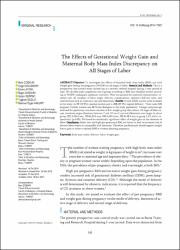| dc.contributor.author | Çoşkun, Bora | |
| dc.contributor.author | Gülümser, Çağrı | |
| dc.contributor.author | Aydın, Emine | |
| dc.contributor.author | Çoşkun, Buğra | |
| dc.contributor.author | Serpim, Gülçin | |
| dc.contributor.author | Güçlü, Tuğberk | |
| dc.contributor.author | Akkurt, Mehmet Özgür | |
| dc.date.accessioned | 2021-01-27T12:29:00Z | |
| dc.date.available | 2021-01-27T12:29:00Z | |
| dc.date.issued | 2020 | en_US |
| dc.identifier.citation | Çoşkun, B., Gülümser, Ç., Aydın, E., Çoşkun, B., Serpim, G., Güçlü, T. ... Akkurt, M. Ö. (2020). The effects of gestationalweight gain and maternal body mass index discrepancy on all stages of labor. Journal of Clinical Obstetrics and Gynecology, 29(4), 141-147. https://dx.doi.org/10.5336/jcog.2019-71902 | en_US |
| dc.identifier.issn | 2619-9467 | |
| dc.identifier.uri | https://dx.doi.org/10.5336/jcog.2019-71902 | |
| dc.identifier.uri | https://hdl.handle.net/20.500.12511/6420 | |
| dc.description.abstract | Objective: To investigate the effects of maternal body mass index (BMI) and total weight gain during the pregnancy (WGDP) on all stages of labor. Material and Methods: This is a prospective case-control study carried out at a tertiary referral hospital during 1-year period of time. We divided study population into 4 groups according to BMI and classified women according to WGDP; inadequate, optimum, excessive. Then we assessed the maternal characteristics, cesarean rate, all variables of labor stages, delivery complications, operative delivery rates, and interventions such as; induction rate and episiotomy. Results: A total of 523 women were included in the study [n=55 (10.5%) cesarean section and n=468 (89.5%) vaginal delivery]. There were 435 pregnant Turkish women and 88 Syrian Refugees in the study population. Younger maternal age and need for episiotomy was more common in low-weight group than others. All stages of labor except transition stages (duration between 7 and 10 cm of cervical dilatation) was longer in obese group (222.9±35.6 min, 195.8±29.6 min, 200.6±30.4 min, 255.8±38.2 min in group 1,2,3 and 4, respectively) (p<0.05). We found no statistically significant effect of weight gain on the duration of labor. Conclusion: Either low and high pre-gestational BMI are found to lead to increased risk of adverse labor results in compatible with literature. Therefore, professionals should support weight loss or gain to achieve optimal BMI in women planning pregnancy. | en_US |
| dc.language.iso | eng | en_US |
| dc.publisher | Ortadoğu Reklam Tanıtım Yayıncılık Turizm Eğitim İnşaat Sanayi ve Ticaret A.Ş. | en_US |
| dc.rights | info:eu-repo/semantics/openAccess | en_US |
| dc.subject | Body Mass Index | en_US |
| dc.subject | Delivery | en_US |
| dc.subject | Labor | en_US |
| dc.subject | Weight Gain | en_US |
| dc.title | The effects of gestationalweight gain and maternal body mass index discrepancy on all stages of labor | en_US |
| dc.type | article | en_US |
| dc.relation.ispartof | Journal of Clinical Obstetrics and Gynecology | en_US |
| dc.department | İstanbul Medipol Üniversitesi, Tıp Fakültesi, Cerrahi Tıp Bilimleri Bölümü, Kadın Hastalıkları ve Doğum Ana Bilim Dalı | en_US |
| dc.authorid | 0000-0001-8877-2803 | en_US |
| dc.identifier.volume | 29 | en_US |
| dc.identifier.issue | 4 | en_US |
| dc.identifier.startpage | 141 | en_US |
| dc.identifier.endpage | 147 | en_US |
| dc.relation.publicationcategory | Makale - Uluslararası Hakemli Dergi - Kurum Öğretim Elemanı | en_US |
| dc.identifier.doi | 10.5336/jcog.2019-71902 | en_US |


















